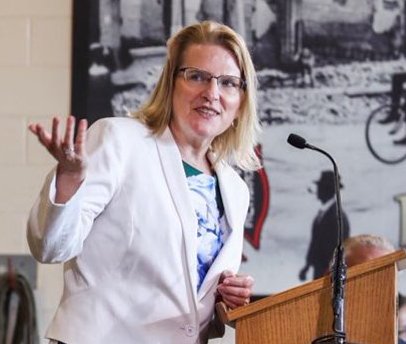
Improving safety for workers and cutting red tape
The Voice of Canada News:
Alberta’s government is restoring balance to Alberta’s labour laws, improving safety for workers and removing unnecessary barriers to job creation.
The proposed Bill 47, Ensuring Safety and Cutting Red Tape Act, 2020, will make workplace safety laws easier to understand and create a more sustainable workers’ compensation system to support Albertans now and into the future.

“Our government is modernizing workplace health and safety laws, making them easier to understand, follow and focus on outcomes. This is about improving safety for Alberta workers and making workplaces safer. We are also restoring balance and fairness to the workers’ compensation system to meet the needs of workers and job creators now and into the future. Workers continue to have rights and protections while job creators face less red tape. The result will be healthier and safer workplaces and will help get Albertans back to work.” Jason Copping, Minister of Labour and Immigration
Bill 47’s amendments to the Occupational Health and Safety Act (OHS Act) and the Workers’ Compensation Act will:
- Remove duplication and redundancy throughout the OHS Act.
- Ensure a balanced approach to enable job creators to find and develop a skilled workforce while improving the health, safety and rights of workers.
- Remove prescriptive elements brought in by the previous government, improve flexibility for job creators and better align Alberta with other jurisdictions.
“We commend Alberta Labour for their collaborative approach to health and safety. By working together, we foster safe, healthy, and innovative workplaces. Changing overly prescriptive rules to a performance-based system will support forestry jobs that contribute to communities throughout the province.”Janis Simpkins, senior vice-president, Alberta Forest Products Association
“We applaud the government for these changes which we believe will ensure both employers and employees are protected, and that workers who are injured are provided meaningful work. We also support these initiatives which, especially during these trying economic times, will provide more economic stability and certainty for employers while providing the maximum protection and support for workers.”Mike Martens, director of public affairs, Progressive Contractors Association of Canada
“The proposed amendments allow Alberta retailers to focus on enhancing workplace safety, and not rigid processes that have added cost and complexity without benefit. We applaud the government on their consultative process that has led to these important improvements in both acts.”John Graham, director of government relations, Retail Council of Canada
“Alberta small businesses have consistently shown their No. 1 concern is the health and safety of their employees and customers. There is no greater example of this than the past couple months where small businesses have quickly adapted business operations to follow all required health and safety guidelines to protect their staff and customers during the pandemic. The changes made to health and safety representatives and committees, along with changes to the Workers’ Compensation Act, strike the right balance of ensuring workplaces remain safe, while also reducing the administrative burden on small businesses.”Annie Dormuth, director, Alberta provincial affairs, Canadian Federation of Independent Business
“Alberta Construction Association applauds the government for restoring balance in workers’ compensation as a no-fault, employer-funded insurance program. Bill 47 will ensure financial sustainability while providing excellent coverage for injured workers today and into the future. Repealing the employer obligation to reinstate injured workers eliminates red tape and duplication with human rights legislation, recognizes that small contractors may not be in a position to create new positions, and provides employment balance between injured and non-injured workers. Nearly 94 per cent of injured workers already returned to work with their employer, so the return to work obligation was unnecessary red tape.”Ken Gibson, executive director, Alberta Construction Association

Improving worker safety through the OHS Act
Changes to the OHS system will remove duplication and streamline laws to support workplace health and safety. This includes:
- Adding flexibility for health and safety committees and representatives for work sites with multiple employers and a prime contractor, such as construction sites.
- Streamlining complaint and appeal processes.
- Incorporating the Radiation Protection Act into the OHS Act will make health and safety laws clearer and easier for job creators and workers to find and follow.
To help inform these changes, Alberta’s government engaged with job creators, workers and health and safety professionals to get their ideas for improvements. In July 2020, government received 320 responses from an online survey on occupational health and safety, and 81 written responses on the workers’ compensation system from key industry, employer, labour and medical representatives.
If passed, changes to the OHS Act would come into force on Sept. 1, 2021.

Creating an affordable, sustainable workers’ compensation system
The revised workers’ compensation system will help Alberta’s workplaces be competitive and support the province’s economic recovery by improving processes, cutting red tape and reducing costs. This includes:
- Transitioning fairness reviews, appeals advisory services and medical panels from the Fair Practices Office and Medical Panels Office to other organizations will remove duplication and save about $2.25 million per year.
- Clarifying presumptive coverage for psychological injuries for firefighters, police officers, peace officers, paramedics, corrections officers and emergency dispatchers.
- Enabling the WCB to calculate cost of living adjustments for compensation benefits.
If passed, most changes to the Workers’ Compensation Act will take effect Jan. 1, 2021. Changes affecting the Fair Practices Office and Medical Panels Office will take effect by April 1, 2021.
Alberta’s Recovery Plan is a bold, ambitious long-term strategy to build, diversify, and create tens of thousands of jobs now. By building schools, roads and other core infrastructure we are benefiting our communities. By diversifying our economy and attracting investment with Canada’s most competitive tax environment, we are putting Alberta on a path for a generation of growth.

Additional quotes
“Increased flexibility around health and safety committees allows small businesses to promote healthy and safe workplaces without the previously required and needless bureaucracy. Changes to potentially serious incident requirements will incentivize reporting, rebuild trust with employers, and provides better information related to data-driven prevention.”Ryan Davis, president, Ryner Safety Inc.
“ITF Association members share a common interest in a fair, balanced and sustainable workers’ compensation system. Many of the announced changes to the Workers’ Compensation Act reflect the views expressed by Alberta employers and will ensure sustainability of the system, which is critical for the workers and employers of this province. Streamlined processes and improved efficiency are a further benefit. We appreciate that government heard our concerns and look forward to collaboration on future initiatives.”Darren Ferleyko, president, Industry Task Force Association
“Volunteers and staff play a huge role in our Ag Society’s ability to operate facilities, offer programs, and host events for the community. Standards to ensure safe and healthy workplaces are important but implementation is sometimes challenging. Less red tape and clear, easy-to-follow regulations with some built-in flexibility are all changes that should prove to be a win-win!”Lauraine Weir, secretary, Ponoka Ag Society
“The health and safety of our members and their employees is paramount. Merit applauds the introduction of Bill 47, Ensuring Safety and Cutting Red Tape Act, as it streamlines workers’ compensation processes and occupational healthy and safety laws for our members.”Malcolm D. Kirkland, president and chief executive officer, Merit Contractors Association



